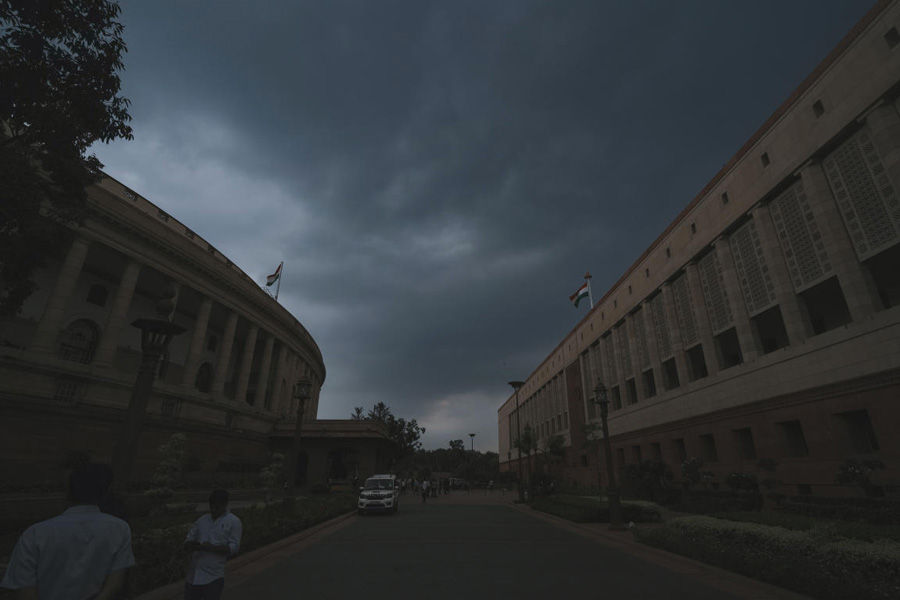The government plans to ram through nine major bills in a compressed 15-day winter session, a legislative blitz that signals its intent to rewire large parts of the Indian economy.
The reforms span the stock market, corporate law, insurance, infrastructure and higher education. But Opposition parties charge that this “conveyor-belt” lawmaking leaves virtually no time for proper scrutiny or debate.
The most politically sensitive proposal is legislation to open the nuclear power sector to private capital, a move that would have been unthinkable even a decade ago.
Six of India’s most powerful corporate groups – Adani, Ambani, the Tatas, Vedanta, JSW Energy and Naveen Jindal’s Jindal Energy – are preparing to enter the nuclear sector as and when they get the final green signal from the government. Their participation, however, will be limited to financing and building small modular nuclear reactors (SMRs).
The government-owned Nuclear Power Corp. of India (NPCIL) will retain full operational control of the plants. The government calls the plan “Active partnerships”, a move designed to draw in private money without breaching India’s long-standing rule that nuclear generation remains a state preserve.
SMRs have been pitched as a fix for the nuclear industry’s longstanding cost and time overruns. Traditional nuclear power plants are huge projects costing billions of dollars and taking a decade or more to build.
For India, the advantage is that as SMRs are smaller in scale, they cost less money upfront and can be built without spending huge sums all at once. Also, SMRs can be assembled more quickly because parts can be made in factories and then put together on-site. India can build a few SMRs first and add more later as the demand for electricity grows, instead of waiting for one massive plant to be ready.
“As the government is looking for active partnerships with private players and the amendment to the Nuclear Power Act to set up nuclear energy capacity, we will take up the opportunities to set up small modular nuclear reactors," Tata Power CEO Praveer Sinha told World Nuclear News, a trade publication.
Critics, however, question whether private companies will focus more on profits than long-term safety and reliability.
The government’s plans for the 15-working-day legislative march have already hit turbulence. It had legislation ready to change the status of Chandigarh and turn it into a union territory run by a lieutenant governor.
The plan encountered huge hostility in Punjab, and even the state’s BJP unit was strongly against it.
The Shiromani Akali Dal blasted the government, and party leader Sukhbir Singh Badal said the bill “would permanently extinguish” Punjab’s long-asserted claim to Chandigarh as its capital city.
He added: “This bill constitutes a direct assault on Punjab’s rights and violates the basic principles of federalism.”
Higher education reform is another high-stakes battle about to be revived after an earlier attempt failed.
The government is once again pushing its plan to replace the University Grants Commission (UGC) and two other regulators with a single Higher Education Commission that would oversee all disciplines except medical and legal studies.
According to the government, the commission aims to “promote excellence through a robust and transparent system of accreditation and autonomy.”
The government says its goal is a streamlined accreditation system. But structurally, the reform centralises regulatory power in a sector where the constitution explicitly gives both the Centre and states a voice. Tamil Nadu and other states derailed the earlier version of the bill for exactly this reason, and those objections are still alive. The proposal will be a test of how far the Centre intends to extend its regulatory reach into what has traditionally been a shared domain.
The economic reforms being planned are equally sweeping.
The insurance bill, a major plank of the government’s long-term financial-sector agenda, seeks to allow domestic and foreign firms 100 per cent ownership of their Indian insurance ventures.
The argument is straightforward: India remains severely under-insured by global standards, and the government wants more domestic and global funds and greater competition to bring down prices. The sector has expanded considerably in recent years, but the government says it would like to supercharge growth.
In the stock market, there is good news for retail investors with the government’s plan to permit fractional share purchases. Analysts say the step marks a significant and long-overdue modernisation of the market, aligning it with global practice. Fractional share purchases allow an investor to buy part of a single share rather than the entire share. It's an important change in a market where some blue-chip stocks like tyre-maker MRF trade at around Rs 1.52 lakh per share, making them far too expensive for small investors.
The government's aim is to bring in more investment quickly, simplify rules by putting greater control in the hands of the Centre, and remove the delays that often hold up big projects.
But the Opposition says bulldozing so many far-reaching laws through in a short session means complex reforms will not get proper examination and result in the passage of flawed legislation.
Trinamool Congress Rajya Sabha leader Derek O’Brien accuses the government of a morbid fear of facing parliamentary scrutiny and of “throttling federalism”. Prime Minister Narendra Modi and his team “continue to suffer from the acute condition called 'Parliament-phobia',” he says.










